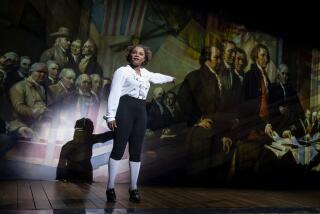17th century -- sort of
- Share via
In “The Colonial House,” which premieres tonight on PBS, a couple of dozen plucky time travelers are dressed in funny clothes and dropped -- rowed, actually -- into a thousand-acre wilderness on the coast of Maine to pretend for five months that it is 1628.
The latest in a line of altered-reality documentaries that began with “The 1900 House,” and has since included “Frontier House” and “The Manor House,” it means to show us exactly how it was different then, though of course it can’t: The real people of 1628 never knew the 21st century, and the people of “The Colonial House” can’t forget it.
None of them will be afflicted with smallpox. They will not have to live through the New England winter, and know they won’t have to. When the gay guy comes out, he won’t be put to death. As on “Survivor,” its crass cousin, there are men with cameras coming around all the time, though there are no prizes waiting at the end of the stay. Hardship here is its own reward.
For viewer and participant alike, the draw of such experiments in entertainment (and “experiment” is a word the producers consistently use) is a fascination with, even a kind of nostalgia for, things beyond our reach -- for the days of wider spaces, of fewer complications (or different ones, anyway), a closer relation to the Earth or to the cosmos. The havoc the Old World would wreak upon the apparently illimitable New had barely begun in 1628.
It doesn’t matter that some of these pilgrims can’t quite manage to put themselves in the past or to play by “the rules.” And the people who get the better roles to play (governor, preacher, freeman) are not surprisingly more eager to play by them -- because any departure from historical reality is just another prompt for the narrator to explain what actually did happen back in the colonial day, every anachronism an opportunity to instruct.
This is PBS, after all -- we are not here, as in less lofty dormitory-reality series like “Big Brother” or “The Real World” merely to watch people flounder and feud or, heaven forbid, fornicate -- but also to learn something.
Of course they do flounder and feud (as to the third item, there seems to be neither time nor privacy, nor energy enough). A social dynamic is established, even if it is not the social dynamic of the early 17th century.
Characters emerge: The early breakouts are Paul, a happy-go-lucky Briton, who spends much time punished for profanity; Michelle, who skips the mandatory Sunday church service to take her family on a naked picnic; and Jeff, a Baptist minister from Waco on a personal mission from God. Appointed the colony’s governor, he’s a serious man dismayed by his fellows’ lack of seriousness -- a rod who does not bend easily in the wind.
The colonists plant corn. They milk goats. They build a house. They fish (with no evident success). They party like a Breughel painting. There are dogs and chickens and pigs, which adapt to the landscape with an ease denied to their self-conscious human fellows.
“The Colonial House” has been assembled as something of an epic -- eight hours as compared with six for “Frontier House” and “Manor House” -- but it’s never dull. And it is beautiful to look at, photographed (by William Edwards) with an eye to detail and composition and color that rivals any feature film, and imbues the series with a double air of reality and of mystery appropriate to the subject and the setting.
*
‘The Colonial House’
Where: KCET
When: 8 to 10 tonight, Tuesday, May 24 and 25
Narrator ... Liev Schreiber
Executive producers Beth Hoppe and William R. Grant. Directors Nicolas Roether Brown, Kristi Jacobson and Sally Aitken.
More to Read
The complete guide to home viewing
Get Screen Gab for everything about the TV shows and streaming movies everyone’s talking about.
You may occasionally receive promotional content from the Los Angeles Times.







